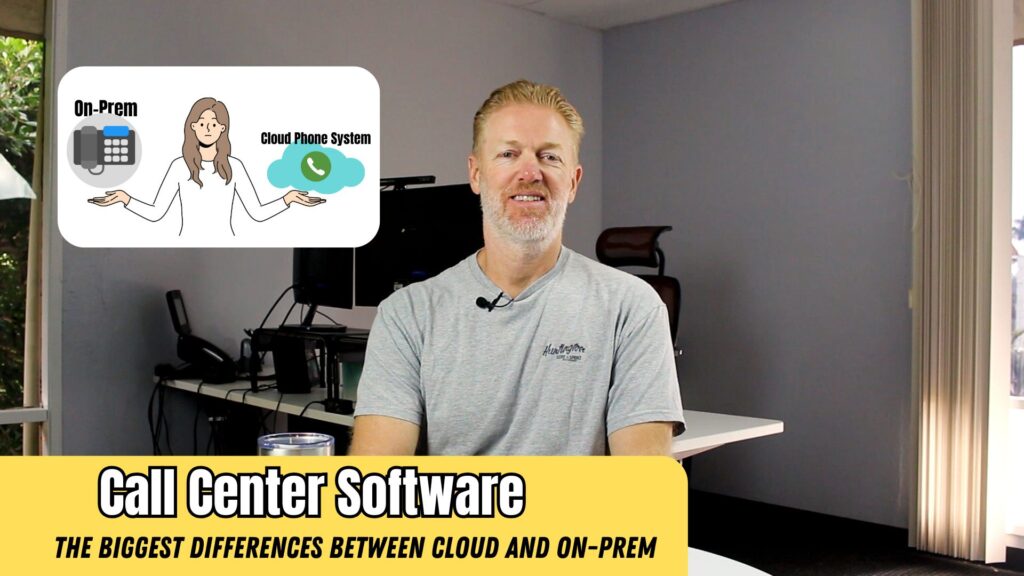Your company is ready to move off your existing on-prem phone system, and you understand this means you’re probably going to move to a cloud phone system. What are the major differences you’re going to need to prepare for?
In this video, I cover the biggest differences between cloud and on-prem phone systems for medium-large size businesses.
Want my recommendations on the best call center software vendors to quote? Ask me today.
About Me

Mike Smith has been helping companies select the best telecom, WAN, security, and cloud services since 1999. He founded AeroCom in 2003, and has been the recipient of numerous business telecommunications industry awards, including being recognized as one of the top 40 business people in tech-heavy Orange County, CA. Follow Mike on YouTube, LinkedIn, Reddit and SpiceWorks.
Transcript
Your company has an on prem phone system today currently, but you’re in the market for a new phone system, which, you know, means you’re probably going to be looking into cloud phone systems. But what are the major differences between on prem phone systems and cloud phone systems that you need to know as you’re going through this process? You’re absolutely right. There are some major differences between the two. I’m Mike Smith. I’m the president of Aerocom. Let’s put our heads together on this.
My Recommendations
But first, if you’d like my recommendation on the best cloud phone system vendors that your company should be coding for your company’s specific needs, reach out, send me an email or give me a call (714.593.0011). Send me an email, give me a call. I love to help you with this stuff and this is why I do the videos so I will help your company make a lot better decision in a fraction of the time. More information on how I do that at the end of the video. Also, don’t forget to subscribe to the channel so you don’t miss any of my videos that I put out every single week. And if you’d like to video, hit the like button and ring the bell and leave me a comment down below, I’d love to hear from you. Tell me, tell me what questions you have. Tell me what you liked about the video. Save the negative comments for yourself. I don’t like hearing those. Maybe email me on the side if you have some feedback. That’d be great. Kind of kidding. Kind of not. Yeah. I’d love to hear from you. I don’t get enough comments, so leave me comment down below.
You’re moving off your on-prem phone system. Now what?
What are the main differences between an on prem phone system and a cloud phone system? Well, the first one is that there are no servers with a cloud phone system. So, you know, the servers you have in your your data center right now, your server room right now, your phone room sitting in in your company. Well, you don’t have to have any phone servers in there anymore. So I know your i.t departments are really bummed about that, but that’s true. So what hardware is there? Well, you do have to have desk phones sometimes. Maybe your company doesn’t need desk phones, but if you do need desk phones, your options are going to be you could either purchase them yourself or you can rent them from the service provider or you could purchase them from the service provider. Some service providers do that. The nice thing is most of the time, no matter where you purchase them, the phones will be preprogrammed and shipped to you, so they’re really plug and play. So it’s really simple. And then in terms of phone choices, the most popular desk phones out there are going to be either poly or yay length. Those are the two that I see all the time. And it’s, you know, some of it is based on the buttons that you want to be able to have on your phone. Some of it’s based on esthetics, so it’s really up to you which model that you choose. But the nice thing about cloud phone systems is for the most part, they’re pretty universal when it comes to desk phones.
What are the biggest differences between cloud and on-prem phone systems?
So they’re not, you know, back in the old days, like your current or your current on prem system, you have to have a certain type of desk phone that matches that system. Wear with cloud phone system, that’s not the case. The cloud phone systems can take multiple types, multiple makes and models of desktop phones. So your options are kind of open. There. Well, if you don’t want to have a desk phone, you can use a headset. Again, kind of wide open there. Do you want wired headsets? Do you want Bluetooth headsets? It’s really up to you. But if you just have people in the office that want to use their softphone on their computer, their phone system software and a headset, that’s totally normal. And these days a lot of companies are kind of getting away from the phones and going with headsets only for cloud phone systems. the last thing you need to worry about for hardware is ATA’s. Those are just analog converter devices. So if you have analog equipment like fax machines or overhead paging systems or access systems for doors or gates, things like that, that you want to be tied to the phone systems that can still happen. You just have to use an ATA device to convert the signal from analog to digital. So but that’s really all the hardware you need is desk phones, you know, maybe some headsets and some 88 devices. Other than that, you don’t really have to worry a whole lot about any hardware.
Internet access
Okay, Now let’s talk about Internet access. Internet access is definitely more important with cloud phone systems, obviously, than they are on prem phone systems. is your Internet connection good enough for cloud phone system? Probably it is. You know, you just have to make sure you have a decent Internet connection. Decent meaning that it’s not barely alive. Like as long as you have like a business class cable connection that works well for you guys or a business class fiber connection, even better, as long as you have one of those, you’re probably pretty good phone calls only take 100 K per call typically. So if you think about that, if your connection is 150 megs and your phone calls are only 100 K per simultaneous call that’s taking place, you can quickly do the math to realize you don’t need a whole lot of bandwidth to run your phone calls over your Internet connection. So bandwidth wise, you’re probably going to be set. And if your Internet connection is working well for you today, it’s probably going to work well for you moving forward. You should, however, invest in a backup Internet connection. I recommend that for all businesses, no matter what the size. So maybe your primary is a business class fiber connection for like a mid-sized company. Your backup should be like a business class cable or some type of a broadband shared connection. Those are fairly inexpensive, or maybe tertiary connection is a 5G or an LTE or 4G connection so that you have three.
Backup internet & Telecom Provider
So even if you’re a small business with business class, cable is your primary, you can at least get like a 4G backup. So I recommend that for all businesses just because if you have anything more than ten people working in the office on the phone, using the phones, using the computer as a backup just makes a lot of sense because, you know, if your Internet connection goes down, all of your employees are going to say that they can’t work anymore. So definitely get a backup Internet connection in for you. Midsize to large companies. You might also want to look into SD when for more information on SD when reach out and contact me. I’m also a broker for SD when I’ve got a bunch of videos on it, you can watch that. But that’s also something that you might want to look into. The question I get a lot about on prem systems versus cloud phone systems is do we need our current telecom provider anymore? The answer is no. All of your current telecom bills are going to go away. So your strong, pure eyes, analog lines, things like that, that’s all going to go away. All the phone numbers and dial tone are going to be provided from your cloud phone system provider unless you keep a couple of analog lines around for alarms or fax machines all your phone bills are going to go away. A nice thing about cloud phone systems that’s different than on prem, is it? Maintenance is included, so you no longer have to purchase a maintenance contract. So that’s all included with cloud phone systems.
Licensing
Another thing that’s included is licensing. So with on prem systems, remember in the past your licensing expires, you have to renew your licensing, You have to pay every 3 to 5 years or so for licensing. Not the case with cloud phone systems. Licensing is included as well. something you might be wondering about with a cloud phone system? Is your data infrastructure? Is our local area network ready for a cloud phone system? Maybe you have a TDM based phone system today using like a PRI, something like that. And you’re going to a cloud phone system. Hey, is our network ready for that? Well, a couple of things you might want to check there. Data Jacks. Do all of your handsets or desk phones today have a data jack available as opposed to, you know, an analog phone system or say so you have a warehouse and you have analog phones sitting out there plugged into the old school, phone Jack, but you don’t have a data jack available. So that’s something you may want to think about adding a data jack at those locations. Or sometimes a service provider can just provide you an ATM device, like I mentioned earlier, that will help you convert those analog phones over to a digital signal. So something you might want to think about as you transition.
Okay, let’s talk routers and switches on your local area network. Something that you always want to make sure is that all of the firmware on all of your switches and routers is the latest firmware available. That’s sometimes going to cause you problems with cloud phone system voice quality. If that’s not the case. Also make sure that SIP algae is disabled on all of your routers or cable modems.

Prioritization
And lastly, something you might want to do is make sure that you have prioritization set up on your routers or SD when device to prioritize voice calls over other internet traffic. Voice is a real time data transmission as you know, so that should take first priority like voice and video should be priority number one. And after that, you know, email, that type of thing, or CRM type of traffic. But you just want to make sure that the low priority traffic is low priority and the voice takes precedence when it comes to routing data. What about the installation? The nice thing about cloud phone systems is that it’s a completely remote installation. So with on prem systems, man, I remember I’ve been in this industry over 20 years on prem. systems would require technicians to be out several days on site, setting up the phone system, plugging in all the phones. Well, now with cloud phone systems, it’s all remote. They ship you the phones, they’re already preprogrammed and the phones are just plug and play. As soon as you plug them in, they find home and everything’s all registered. So super easy installation and everything’s remote. So no, people need to be on site for your installation. You can have people on site if you want, but it’s going to be pricey. You can pay the service providers to have somebody come out and help you install the system, but all they’re really doing is plugging in phones and maybe training some people on site. And it’s pretty pricey as opposed to just having it all done. Remote
Remote Training
speaking of training, like I said earlier, the training is going to be remote as well. You can do any type of training that you want. You can train the trainer or you can set up several different training sessions for your employees where maybe they’re live sessions and they go over stuff live, and then the service providers for cloud phone systems always have a huge library of how to videos when it comes to the phone system. So they can have prerecorded training with YouTube training, they can have how to videos on individual things that they’re trying to do ongoing for eternity is you have the phone system or they can do train the trainer live training sessions or they can do maybe some live training for all of your employees so they can ask questions and all that good stuff. So it’s up to you how you want to do the training. Sometimes service providers include a certain amount, maybe train the trainer and they charge a little bit more. If you want to do training sessions with employees, it depends on the service provider that you choose. And then lastly, how does the phone system get installed with the cloud phone system? Well, a lot of the times what they’ll do is they’ll set up the phone system side by side with your current phone system, and they’ll give you temporary phone numbers and get everything set up on the cloud phone system and working exactly how you want. So you can test it. You can have calls coming in and the auto attendant, you can be transferring calls, you know, voicemail calls on hold music all of set up ahead of time with temporary phone numbers.
Port forwarding your numbers
And then you can forward your existing phone numbers to those temporary phone numbers. And then finally, they put the phone numbers over your existing phone numbers. They’ll port those phone numbers over to your cloud phone system, and then everything’s already set up. Everything’s working. You’re good to go. So it’s a nice, easy transition, much easier than transitions that you’ve had in the past.
Still confused? Reach out and contact me
I know I covered a lot of information on that. So if you have any questions, especially if you’re a mid-sized company, that’s really my specialty. Reach out, send me an email or give me a call (714.593.0011) in a most important, if you’d like, my recommendation on the best cloud phone system vendors your company should be quoting, especially if you’re mid-sized organization, like, say, 50 to 100 or more people reach out and contact me. That’s what I do. That’s my specialty. I’ve been a broker for all of the major cloud phone system vendors in this industry for over 20 years. I know the gray on my beard ages me a little bit, but I know all the vendors. They each have their niche. There’s definitely some vendors that don’t have a very good reputation that you want to avoid as well. So reach out and contact me. Send me an email, give me a call. I would love to help you with the stuff. I do it every day. I love talking about it as you seen on these videos and I will introduce you to the best vendors to work with. I’ll introduce you to the best salespeople to work with that.
Subscribe to me for more content
Those vendors. I will oversee the demo so you get a nice demo or oversee the coding process and make sure you get the best pricing on the provider of your choice. And the nice thing is, on top of all that, all those benefits, I don’t charge your company a dime. The service providers, the cloud phone system companies pay me my broker fee, so there’s no excuse not to at least reach out and see what I have to say. Again, I love talking about it. I love to hear from you. It’s the reason why I do these videos and it’s a nice way to say thank you. If you got something out of the video. So reach out. Send me an email, give me a call. All you midsize businesses, I love to talk to you. And as always, make sure you subscribe to the channel so you don’t miss any of my weekly videos that I put out. And if you like it like the video, ring the bell. Leave me a comment down below. I’d love to hear from you. Thanks again for watching and I will catch you on the next one.







